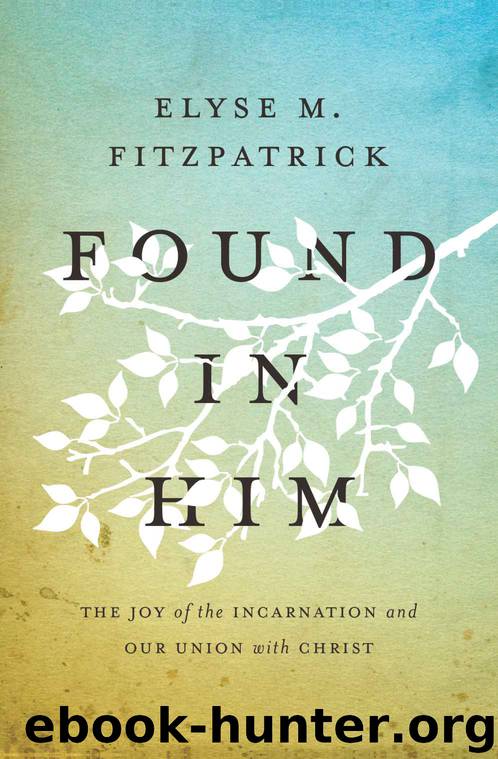Found in Him: The Joy of the Incarnation and Our Union with Christ by Fitzpatrick Elyse M

Author:Fitzpatrick, Elyse M. [Fitzpatrick, Elyse M.]
Language: eng
Format: epub
ISBN: 9781433533259
Publisher: Crossway
Published: 2013-10-31T00:00:00+00:00
HE COULD NOT BE BOUND BY DEATH
He had been bound by death, as death binds us all, but death would not be victorious over him. Death’s ultimate degradation, the decomposition of the body, was not part of Jesus’s necessary obedience. The Father would not allow his beloved Son to undergo decay. In fact, it was impossible that the body he had taken to himself should dissolve—for it was this very body that he would animate once again into life eternal as he led his bride forth from her grave into new life.
And so—and at last—in response to His Son’s “It is finished!” the Father
thundered an
“Amen!” from heaven, and Jesus’s heart began to beat once more.
In that one instant the inevitability of the death and deconstruction that had been the trajectory of all humanity since our dreadful fall screeched to a halt. A great reversal had begun. A great harvest day had commenced since that “grain of wheat” had fallen into the ground and died (John 12:24). A new race of men and women were born, a new race of beloved ones recreated in the image of God. A new humanity who will never die had come to life.
God raised him up, loosing the pangs of death, because it was not possible for him to be held by it. . . . “For you will not abandon my soul to Hades, or let your Holy One see corruption. . . .” [David] foresaw and spoke about the resurrection of the Christ, that he was not abandoned to Hades, nor did his flesh see corruption. This Jesus God raised up. (Acts 2:24, 27, 31–32)
Peter preached that God had loosed his Son from the “pangs of death.” These death pangs speak of the pain and labor of birth. Although it might seem strange to us, we can say that in his death and resurrection Jesus is giving birth; he felt the pangs of death, he labored to bring forth offspring. In fact, he said something like this in John 16 when he was talking to his disciples about his impending death and the sorrow that they would feel—sorrow that would be turned to joy, just as a woman has sorrow as she labors and her pains are upon her:
But when she has delivered the baby, she no longer remembers the anguish, for joy that a human being has been born into the world. (John 16:21)
Out of his tomb that was a womb, a new creation comes forth. He has been born anew, but this time he is not alone. He is both the one being born and the one giving birth, for in his new life he brings with him all the children God had given him (Heb. 2:13). As Jesus himself was born into deathless life, he was also the firstfruits of a new humanity. In his birth from death, he brought with him all of his brothers of whom he was “not ashamed” (Heb. 2:11).
Of his own will he brought us forth by the word of truth, that we should be a kind of firstfruits of his creatures.
Download
This site does not store any files on its server. We only index and link to content provided by other sites. Please contact the content providers to delete copyright contents if any and email us, we'll remove relevant links or contents immediately.
The Secret Power of Speaking God's Word by Joyce Meyer(3180)
Signature in the Cell: DNA and the Evidence for Intelligent Design by Stephen C. Meyer(3130)
Real Sex by Lauren F. Winner(3014)
The Holy Spirit by Billy Graham(2944)
The Gnostic Gospels by Pagels Elaine(2527)
Jesus by Paul Johnson(2352)
Devil, The by Almond Philip C(2324)
23:27 by H. L. Roberts(2248)
The Nativity by Geza Vermes(2226)
Chosen by God by R. C. Sproul(2161)
All Things New by John Eldredge(2159)
Angels of God: The Bible, the Church and the Heavenly Hosts by Mike Aquilina(1957)
The Return of the Gods by Erich von Daniken(1942)
Angels by Billy Graham(1922)
Knowing God by J.I. Packer(1854)
Jesus of Nazareth by Joseph Ratzinger(1811)
The Gnostic Gospel of St. Thomas by Tau Malachi(1793)
Evidence of the Afterlife by Jeffrey Long(1786)
How To Be Born Again by Billy Graham(1777)
